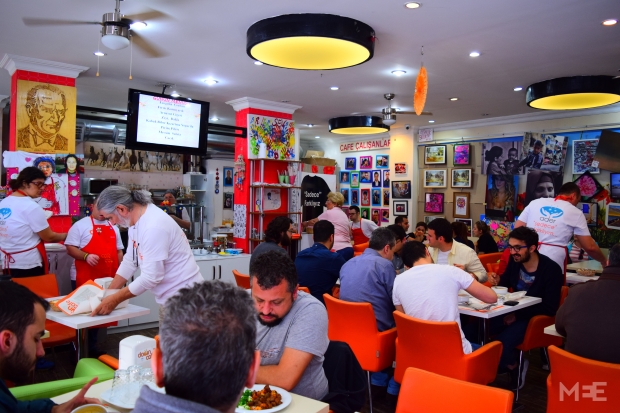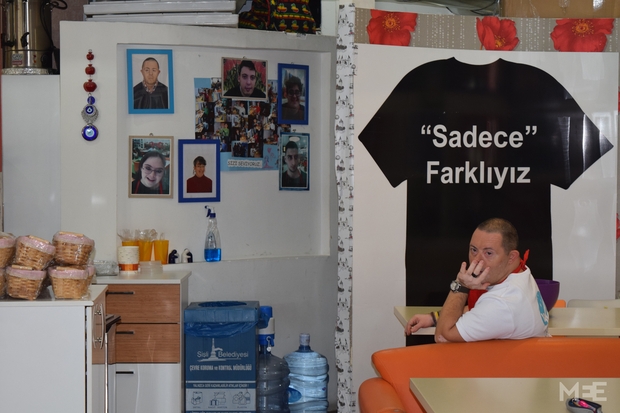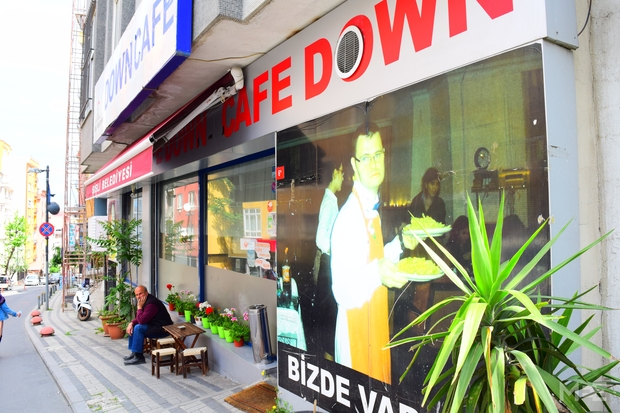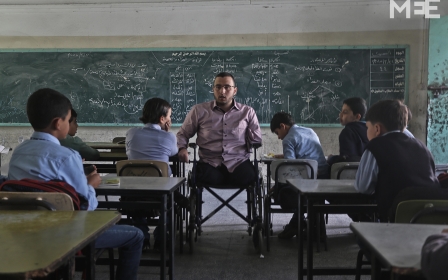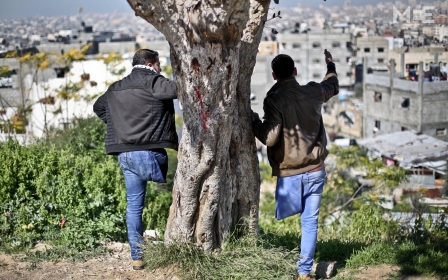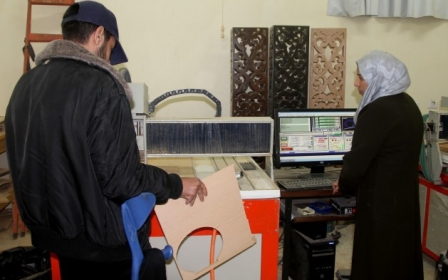'We're just different': The Istanbul cafe that's challenging attitudes on disability
ISTANBUL, Turkey – “Hello, how are you? I am fine. Welcome,” repeats Deniz Sisman in a sing-song tone as customers arrive for lunch.
The 27-year-old, who is autistic, uses the same happy refrain to greet all who arrive at the Down Cafe in Sisli, a bustling Istanbul business district.
New customers sometimes do a double-take at this effusive greeting, or on seeing that other servers have Down's syndrome or other cognitive development related conditions.
They quickly feel comfortable, however, as the sheer happiness of the staff and the pride they take in their jobs becomes clear. This is in stark contrast to many of the other lunchtime eateries in the area.
The service is quick and efficient and the high standards and variety ensure that regulars keep coming back.
The customers are happy, but what is more significant is the immense impact that the Down Cafe has had on its own staff - providing them with an unexpected opportunity to lead productive lives.
“Oh good, are we doing an interview? Ok, let me tell you about all my responsibilities,” says Sisman, who has worked at the cafe for four years. He enthusiastically lists the many tasks he performs, which include laying the tables, serving food and tea to customers, and sweeping the floor.
Yet it is when he speaks about his salary that a real sparkle appears in his eyes.
“I am a professional. I earn a salary. I give it to my mum who buys me clothes with it and uses it for us to go on holiday.”
It is exactly this sense of empowerment that led Saruhan Singen, the founder of the Down Cafe, to embark on this path.
Singen, whose own daughter Sezin has Down's syndrome, knows about the challenges that come with having a family member who is different. It is estimated that around 100,000 are living with Down's syndrome in Turkey, just a small percentage of the 6 million people globally with the condition.
In Singen’s view, creating an opportunity for the kids – he calls all staff, including his daughter, "my kids" – is just as important as providing education and rehabilitation opportunities.
“For years, the only option for me and others in a similar situation was to keep our kids at home and let life pass them by. One day I realised that it is only me who can try to change this instead of waiting for a miracle,” says Singen.
Today, 26 people with various conditions that include Down's syndrome and autism work at the Down Cafe, on rotation, for around four days each a month. This system allows the cafe to provide the opportunity to more people.
“One of the achievements I am most proud of is that we have managed to find job placements for 10 of our kids in other businesses during this time,” says Singen. “We managed to show people that with a little training these kids can be very productive and are not a burden.”
'We are just different'
The story behind the Down Cafe’s launch began five years ago in 2011 when Singen approached the Sisli district municipality and explained his plan. Their response was enthusiastic - the authorities provided him with the premises for free and he has never been charged for utilities including water and electricity.
Buoyed by this generosity, Saruhan, an architect, has decorated the place himself with bright, cheerful colours. This was because despite the many significant goals the cafe hopes to achieve - whether it be increasing public awareness, empowering the staff with such conditions and allowing them to be active in their community - one important goal of the Down Cafe is to celebrate difference.
Even the uniforms worn by staff members carry the motto “We are 'just’ different,” which has come to define the essence of the Down Cafe. The cafe also uses every opportunity to increase public awareness, and the food mats are full of information on Down Syndrome, autism and intellectual disability as well.
The Down Cafe has proven to be a success, but it was not always all plain sailing. Singen remembers that in the first six months customers were hesitant about coming to a place called Down Cafe and where the staff appeared to be different.
“Of course we always had the option of choosing another name, but then what would be the point? We wanted to make people aware and hopefully also encourage them to become involved through the simple act of choosing to have their lunch here,” says Singen.
Civil engineer Kadir Bugra, 25, who is a frequent customer at the Down Cafe along with his colleagues, says the simplicity of the message adds to its strength.
“It is a great way to run a social responsibility project. No one is trying to guilt-trip us into doing something. Just by choosing to have lunch here we are doing our part,” says Bugra. “Also the food is good and the staff are great fun to chat with. We don’t come here expecting five-star service, but it isn’t that far off those standards either.”
Although the cafe is well-established, they still have times when it is tough to stay in the black; for instance during Ramadan, the Muslim month of fasting, when the number of clientele drops. But, says Singen, it is then that the loyal customers come to the fore.
“Someone will donate a big can of olive oil. Someone else will bring in a sack of rice and so on. We manage to avoid going into loss.”
The success of the Down Cafe has meant that Singen now gets calls from people all over the country saying they want to do something similar in their area and asking for advice on how to proceed. A similar cafe in Istanbul’s Asian district of Uskudar also opened earlier this year.
There is, however, a tale of caution here as the wish to undertake similar initiatives grows. Dealings involving people with such conditions requires training and experience, and a wary eye needs to be kept on those seeking to exploit such people as a sales gimmick for a purely commercial enterprise.
Volunteer mothers key to success
None of this would be possible without the input and hard work of the volunteer mothers at the Down Cafe, says Singen.
“We only have two fully able-bodied paid staff here. Everyone else you see helping out here are our volunteer mothers. If if wasn’t for their dedication, this project would never have gotten off the ground and would never have managed to keep going,” says Singen. “These mothers almost always instinctively know whether it is a kind word or a reprimand that will do the trick. They ensure that everything runs perfectly.”
Sibel Burunsuz is one of these volunteer mothers. Her case differs slightly in the sense that she does not have any children of her own with such conditions. She says she first became aware of these issues 25 years ago when her friend gave birth to a child with Down's syndrome.
Ever since she has empathised and looked for ways to be of assistance. She came across the Down Cafe just as it was preparing to launch and volunteered her services. Now she manages the day-to-day running of the cafe.
“None of the kids here are biologically mine like the other mothers. But just like them I see all our kids as my own. It is a privilege to work with them and they are all great,” she says.
When Singen embarked on this journey, his goal was to raise public awareness, to allow people like Deniz Sisman to be active and productive members of their communities, and to do it all with a smile on their faces.
So far, Down Cafe is exceeding those expectations.
New MEE newsletter: Jerusalem Dispatch
Sign up to get the latest insights and analysis on Israel-Palestine, alongside Turkey Unpacked and other MEE newsletters
Middle East Eye delivers independent and unrivalled coverage and analysis of the Middle East, North Africa and beyond. To learn more about republishing this content and the associated fees, please fill out this form. More about MEE can be found here.


